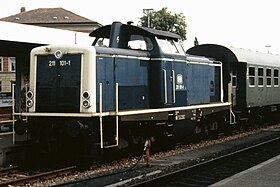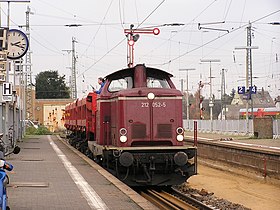DB Class 213
| DB Class V 100.10 later: DB Class 211 and: DB Class 212, 213, 214 |
|
|---|---|

211 101
|
|
| Number(s) | V 100 1001 - 1005 V 100 1007 - 1365 211 001 - 005 211 007 - 365 |
| Quantity | 364 |
| Manufacturer | MaK |
| Year(s) of manufacture | 1958 - 1963 |
| Retired | 2001 |
| Axle arrangement | B'B' |
| Track gauge | 1,435 mm (4 ft 8 1⁄2 in) |
| Length over buffers | 12,100 mm (39 ft 8.4 in) |
| Service weight | 62.0 t (61.0 long tons; 68.3 short tons) |
| Axle load | 15.5 t (15.3 long tons; 17.1 short tons) |
| Top speed | 90 km/h (56 mph) 100 km/h (62 mph) from 211 008 |
| Power output (continuous) | 809 kW (1,085 hp) |
| Starting tractive effort | 177 kN (40,000 lbf) |
| Power index | 13.0 kW/t |
| Motor make/model | (?) |
| Motor type | (?) |
| No. of traction motors | 1 |
| Brakes | Knorr compressed-air brake |
| Train protection | Sifa/Indusi |
| DB Class V 100.20 DB Classes 212 and 213 |
|
|---|---|

212 052-5 in purpurrot in Friedberg
|
|
| Number(s) | V 100 2001 - 2381 212 001 - 331 212 342 - 381 213 332 - 341 |
| Quantity | 381 |
| Manufacturer | MaK |
| Entered service | 1962 - 1965 |
| Axle arrangement | B'B' |
| Length over buffers | 12.100m 12.300m (212 022) |
| Service weight | 63,0 t |
| Axle load | 15,8 t |
| Top speed | 100 km/h |
| Power output (continuous) | 993 kW |
| Starting tractive effort | 177 kN |
| Power index | 15,8 kW/t |
| Motor type | 12-cylinder motor |
| Brakes | Knorr compressed-air brake |
| Train protection | Sifa/Indusi |
These DB Class V 100 diesel locomotives were produced in the late 1950s by the Deutsche Bundesbahn for non-electrified branch lines as a replacement for steam locomotives. The V 100 class was built in three different variants.
Decommissioned locomotives were also used in Austria by the Austrian Federal Railways during the 1990s and early 2000s, where they were registered as ÖBB Class 2048
The Class V 100.10 was a diesel locomotive for light passenger and goods traffic on branch lines. It was developed in 1956 by the Bundesbahn Central Office in Munich together with the engineering works, Maschinenbau Kiel (MaK), for the Deutsche Bundesbahn.
In the late autumn of 1958 the first six trials engines were delivered. Numbers V 100 001 to 005 were fitted with an 809 kW (1,100 HP) motor, but number V 100 006 was given a 993 kW (1,350 HP) motor. The latter formed the basis for the V 100.20, later DB Class 212. Number V 100 007 was built by MaK as the seventh trial engine and tested in Sweden; it was sold in 1959 to the Deutsche Bundesbahn. In 1960, the prototype series, numbers 001 to 005 and 007 were renumbered to V 100 1001 to 1005 and 1007 in order to better distinguish them from the more powerful V 100 006. In 1961 the production series was started, the run lasting until 1963. As well as MaK, the firms of Deutz, Maschinenfabrik Esslingen, Henschel, Jung, Krauss-Maffei and Krupp were involved in building the locomotives.
As part of the renumbering of locomotives by the Deutsche Bundesbahn in 1968, the V 100.10 was redesignated as DB Class 211. The Deutsche Bahn AG inherited the locomotives in 1994.
...
Wikipedia
